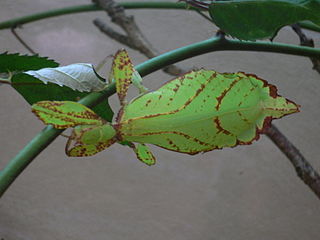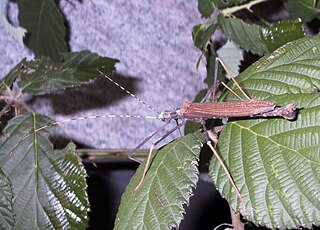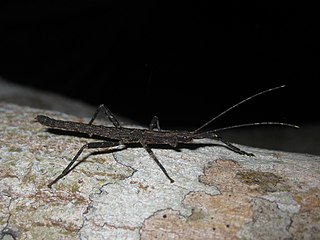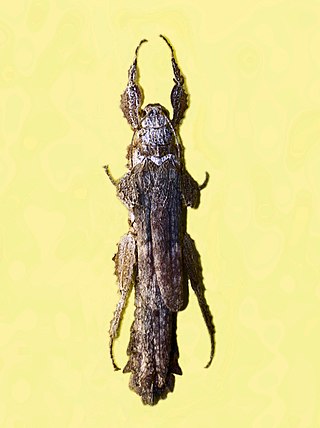
Phobaeticus is a genus of Asian stick insects comprising over 25 species. The genus includes some of the world's longest insects.

Phyllium is the largest and most widespread genus of leaf insects in the family Phylliidae (Phasmatodea). They can be found in Sundaland, Philippine Islands, Wallacea, and Australasia.

Pseudophasmatidae is a family of stick insect, in the suborder Verophasmatodea, commonly called the "striped walkingsticks". An important identifying characteristic is its mesothorax, which is never more than three times as long as the prothorax.

Malacomorpha is a genus of striped walkingsticks in the family Pseudophasmatidae. There are about 15 described species in the genus Malacomorpha.

Diapheromerinae is a subfamily of the stick insect family Diapheromeridae. They belong to the superfamily Anareolatae of suborder Verophasmatodea.

Prisopus is a genus of stick insects belonging to the family Prisopodidae. These stick insects are present in Central and South America, India and Malesia.

Pseudosermyle is a genus of walkingsticks in the family Diapheromeridae. There are more than 20 described species in Pseudosermyle.

Diapheromerini is a tribe of walkingsticks in the family Diapheromeridae. There are at least 30 genera Diapheromerini.

Haplopus is a genus of walkingsticks in the family Phasmatidae. There are about seven described species in Haplopus.

The Clitumninae are a sub-family of stick insects in the family Phasmatidae found in Asia. The type genus Clitumnus is now considered a synonym of Ramulus.

The Lonchodinae are a subfamily of stick insects in the family Lonchodidae found in: Australasia, Asia, Africa, Southern America and the Pacific.
Tirachoidea is an Asian genus of stick insects in the family Phasmatidae and tribe Pharnaciini. Species have a known distribution from India, Indochina and West Malesia.

Achrioptera is a genus of stick insects first described in 1861. It is one of two genera in the tribe Achriopterini, the other being Glawiana. Species in the genus Achrioptera occur in Africa, including Madagascar. Although they are brightly colored, members of Achrioptera are able to effectively mimic thorny twigs and sticks for camouflage.
Baculonistria is a genus of phasmids belonging to the family Phasmatidae, with records from China.

The Cladomorphinae are a subfamily of stick insects in the family Phasmatidae. This taxon is particularly well represented in the Neotropical region, but records also exist for Madagascar, Java and the Maluku Islands.

Phyllium philippinicum is a species of leaf insect in the family Phylliidae. It is endemic to the Philippines.

Phasma gigas is a large-sized stick insect found in Maluku Islands, Gorong Islands and Kei Islands. It is often believed that Phasma gigas is present on New Guinea, but in fact, all New Guinean records actually refer to Phasma reinwardtii. Furthermore, the historic records from Sulawesi are doubtful and need more evaluation.
Phaenopharos is a genus of phasmids belonging to the family Lonchodidae.
Cnipsomorpha is a genus of Asian stick insects in the tribe Medaurini, erected by Hennemann, Conle, Zhang and Liu in 2008. Species have been recorded from: southern China and Vietnam.

Frank H. Hennemann is a German entomologist and taxonomist who works in the field of biodiversity research on the systematics and biogeography of stick insects (Phasmatodea).














